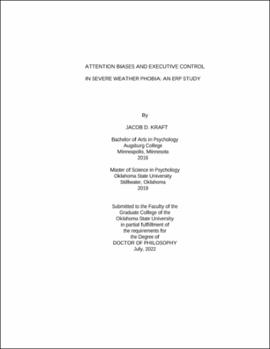| dc.contributor.advisor | Grant, DeMond | |
| dc.contributor.author | Kraft, Jacob D. | |
| dc.date.accessioned | 2023-04-05T16:21:00Z | |
| dc.date.available | 2023-04-05T16:21:00Z | |
| dc.date.issued | 2022-08 | |
| dc.identifier.uri | https://hdl.handle.net/11244/337292 | |
| dc.description.abstract | Severe Weather Phobia is the excessive and unreasonable fear or anxiety regarding severe weather events. Literature on this topic is largely limited to case studies and no study has aimed to document potential maintenance factors. Utilizing models from other anxiety disorders, worry and attention biases may be investigated as potential maintenance factors. The current investigation aimed to determine whether attention biases towards pictorial (Study 1) and written (Study 2) stimuli are present within severe weather anxiety. Study 1 also aimed to evaluate whether engaging in worry regarding an upcoming severe weather event modulates attention biases using event related potentials. Results of Study 1 indicated that engaging in worry did result in increased anxiety regarding an upcoming severe weather threat; however, this increase in anxiety was present in those with and without elevations in trait severe weather anxiety. This study failed to observe any attentional biases within severe weather anxiety. Similarly, no attention biases were observed in Study 2. Overall, results of Study 1 and 2, generally, failed to support hypothesized attention biases to both pictorial and written stimuli. These results could suggest that those with severe weather anxiety do not present attentional biases similar to those observed in other anxiety disorders; however, a potentially more likely explanation is that the valance, arousal, and intensity of the stimuli presented in the paradigms were not robust enough to elicit an anxious response or bias in attention. A wider variety of severe weather stimuli should be investigated to determine which stimuli and at what intensity results in attention biases, increases in state anxiety, and psychological arousal. Once stimuli are developed, investigations into their impact on executive function and psychophysiology can be pursued. | |
| dc.format | application/pdf | |
| dc.language | en_US | |
| dc.rights | Copyright is held by the author who has granted the Oklahoma State University Library the non-exclusive right to share this material in its institutional repository. Contact Digital Library Services at lib-dls@okstate.edu or 405-744-9161 for the permission policy on the use, reproduction or distribution of this material. | |
| dc.title | Attention biases and executive control in severe weather phobia: An ERP study | |
| dc.contributor.committeeMember | Wells, Tony | |
| dc.contributor.committeeMember | Mullins-Sweatt, Stephanie | |
| dc.contributor.committeeMember | Defreitas, Jason | |
| osu.filename | Kraft_okstate_0664D_17071.pdf | |
| osu.accesstype | Open Access | |
| dc.type.genre | Dissertation | |
| dc.type.material | Text | |
| dc.subject.keywords | attention bias | |
| dc.subject.keywords | severe weather anxiety | |
| dc.subject.keywords | tornado | |
| dc.subject.keywords | weather phobia | |
| thesis.degree.discipline | Psychology | |
| thesis.degree.grantor | Oklahoma State University | |
